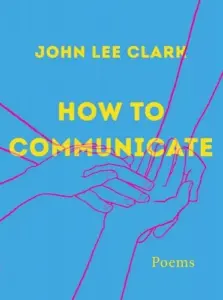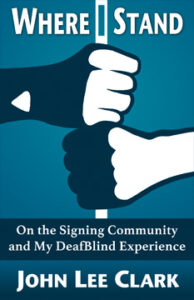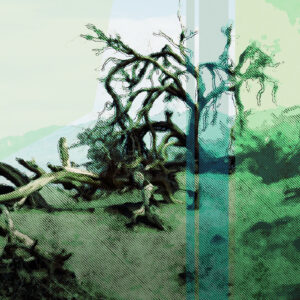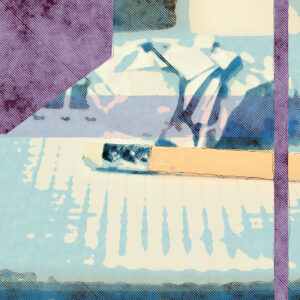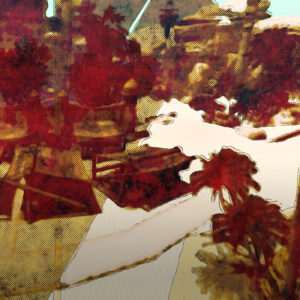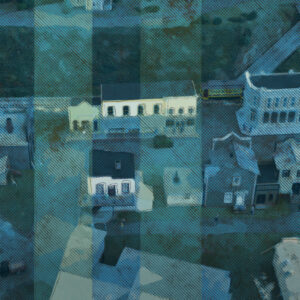John Lee Clark
Self Portrait
If you had to make a self portrait of your daily morning routine through language and sensation, what would you include? John Lee Clark offers memories of a birthday through experiences the body holds.
We’re pleased to offer John Lee Clark’s poem, and invite you to connect with Poetry Unbound throughout this season.
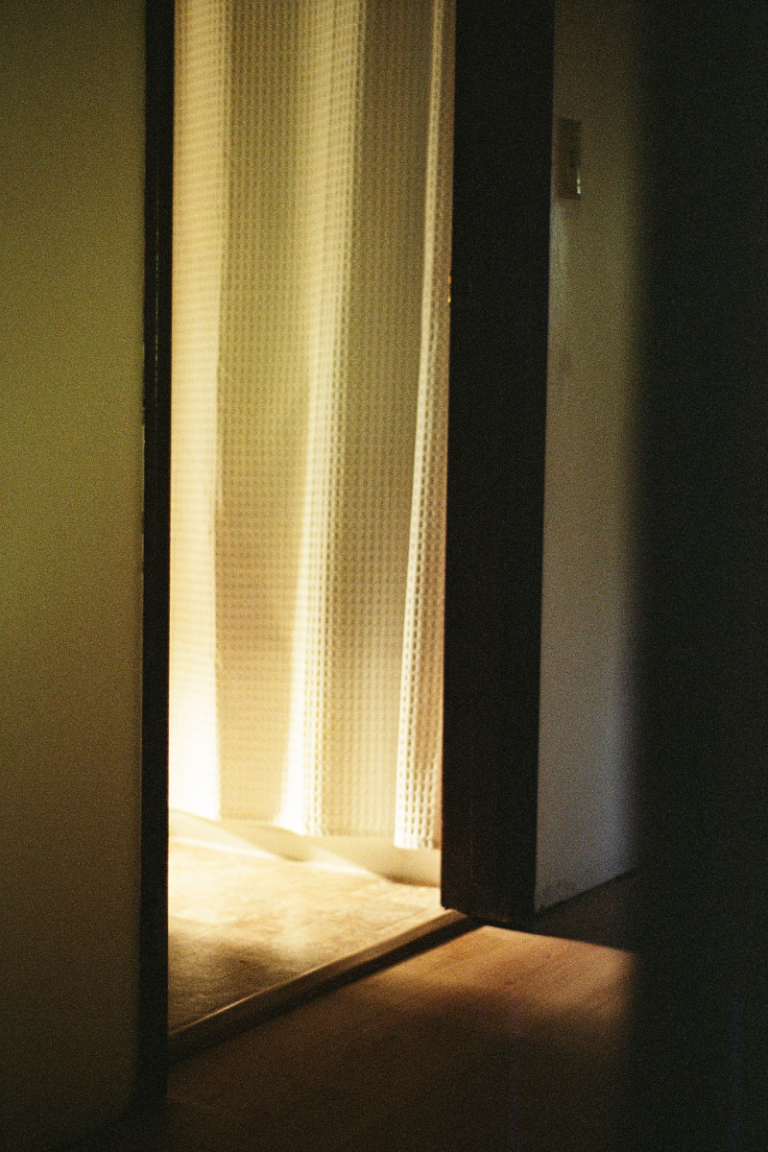
Image by Annisa Hale/ Film processed by Moody's Film Lab, © All Rights Reserved.
Guest
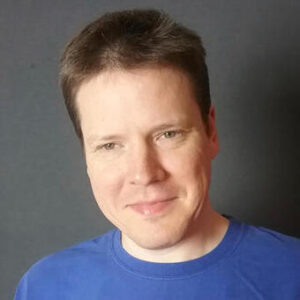
John Lee Clark is a DeafBlind poet, essayist, historian, translator, and an actor in the Protactile movement. He is the author of the poetry collection How to Communicate (W. W. Norton & Company, 2022) and the essay collection Where I Stand (Handtype Press, 2014). Clark is a 2021-2023 Bush Leadership Fellow, a core member of Protactile Language Interpreting National Education Center, and a research consultant with the Reciprocity Lab at the University of Chicago.
Transcript
Transcription by Alletta Cooper
[music: “Praise the Rain” by Gautam Srikishan]
Pádraig Ó Tuama: My name is Pádraig Ó Tuama, and for years, almost 15 years, I lived in community houses. And you get to know all kinds of powerful things about people when you go through your morning routine with other people in community houses, you know? Who is it that doesn’t even want to be said hello to? Who is it that’ll offer people a cup of tea? Who is it that’ll try to start a conversation about existentialism or something, and you need to avoid them? There’s something about the languages of each other, which isn’t just the words you’re saying, but how it is and who it is you are first thing in the morning that is powerfully intimate and filled with information.
“Self Portrait” by John Lee Clark
“on the morning of my forty-second birthday
“The kneading of my broad swimmer’s back by Adrean my beloved is the
first gift. I nuzzle my pillow and inhale. I sniff my glorious hands. They take
their turn at the giving. She says I am a furnace. In the shower I dig into my
bestubbled cheeks. I scrape each fingernail against the right bottom corner
of my upper left lateral incisor. My marvelous mouth pats the harvested skin
into a soft dab. It rests tasteless on my tongue until I step out. My comb
tickles my lips with a bouquet of pandemic hair. I sample the bitter end of a
Q-tip and am satisfied. The fennel toothpaste searches me and tries me and
finds me lacking in a few places. For Jael still sleeping I am a squeeze at their
ankle. For Armand I am a known engulfment from behind. For Azel I am a
quip and a laugh on his chest. For loafed and purring Angel I am a massive
swoon. For hungry Nib I am two legs to rub against back and forth and to
loop around with the most eloquently insistent tail in the animal kingdom.”
[music: “Cornicob” by Blue Dot Sessions]
There’s so much attention to the body in this poem. You know, it opens up with his back being kneaded — a “broad swimmer’s back,” he calls it — by his beloved as a first gift. And then more sensory references, returning that kneading of the back, “nuzzle the pillow and inhale” and “sniff my glorious hands.” What a lovely way to describe your own hands: “glorious.” And using those hands to give back to the beloved and showering and cleaning and “bestubbled cheeks.” Fingernails. And then this attention to the inside of the mouth. You know, “the upper left lateral incisor,” the “marvelous mouth,” and “the harvested skin.” And skin tasteless on the tongue. And then the lips and the pandemic hair. We’re seeing this poem being particularly located in a period of time, and the taste of the toothpaste and the taste, the feel of the Q-tip in the mouth, and then squeezing of an ankle of a child, and being engulfed from behind, and laughing on the chest of these three children.
All of these things are experiences of communication in the body. And that is the self portrait. It’s a self portrait that’s done through a series of sensations, through a series of encounters with self and with others, with children, with animals. And the idea that “self portrait” of an individual — looking at yourself, beholding yourself, and being yourself — all of that happens through relationships in tiny little moments.
[music: “Delion” by Blue Dot Sessions]
This is such a populated poem. I love it. We get to know the name of pretty much everybody who seems to live in the household, it seems. John Lee Clark lives in the Twin Cities in Minnesota with his wife, Adrean Clark, and we meet these children, Jael, Armand, and Azel, as well as, then, the animals: “loafed and purring Angel” and “hungry Nib.”
He’s going through the day greeting people. There’s such a lot of love, and love as the primary communication. They’re all fluent in the languages of each other, the different ways of communicating, the different ways of starting off the day. Some people like the day started off this way, some people don’t. Some people want to squeeze. Some people want to be alone. All of these lovely fluencies in the languages of each other.
John Lee Clark is DeafBlind, and this poem is from a book called How to Communicate. So he poses all kinds of invitations, and challenges, about the sighted and the hearing world. And some of the poems are funny, some are gracious, some question assumptions and undo projections, some push back and some, like this one, are elevating all the forms of communication that happen in his life and in the life of everybody around. And how communication is fluent and present, and how it is that this sensory detail of the body, both to yourself as well as to all the others in the household — that is the most intimate form of communication.
[music: “Family Tree” by Gautam Srikishan]
I puzzled over the line about the fennel toothpaste. Partly because I love the taste of fennel. So I was tasting toothpaste and fennel in my own mouth, in some kind of an associative projection into the poem. “The fennel toothpaste searches me and tries me and / finds me lacking in a few places.” Search me and try me brings me to a Hebrew psalm: Search me and try me, O God. And so I found myself making associations both with my love of the taste of fennel and with the poetry of the Hebrew Bible when I heard that. But there’s so much of me in that that I wasn’t entirely sure if I trusted where my associations went with that line.
I wonder what it is though. Certainly, it is a way of being present to yourself, asking yourself, “Where am I being searched and tried? Where am I doing well? Where am I lacking?” And here, in the fennel toothpaste, and even in the searching around your own mouth and figuring out what that taste is, that feels like a metaphor for the inner life too, as well as that most intimate of places: your own inner mouth.
[music: “Akonan” by Blue Dot Sessions]
One of the things that this poem is doing is exploring what it means to be known and maybe, even more, what it feels like to be known: by yourself, by the people and animals that you share your house with, and also by the morning routines. To be relaxed into the ordinariness of all these things on the morning of your forty-second birthday, that there’s names and people and predictability and routine that unfolds. And there’s a great consolation in this poem about all of this.
It’s a poem of verbs, and initially, I thought, “I’ll make a list of the verbs.” And I kind of just thought it’s going to be just a list of verbs until I noticed what he did at the end. So the verbs start off: kneading, muzzle, inhale, sniff, giving, says, dig, scrape, pats, rests, step, tickle, sample, search, try, find. Lovely verbs. I really like them. And then toward the end five times there’s this other verb that’s conjugated: I am. I am. I am. I am. I am. What a powerful, primal verb to speak about being.
This is a poem looking back at itself, experiencing itself, knowing itself. John Lee Clark is knowing and feeling and communicating himself through that powerful verb of self-recognition in this. He’s recognizing himself and inviting us to recognize the power of the verb “I am.”
I find myself thinking of Walt Whitman: I sing myself when I read this poem. But what I love about John Lee Clark’s is that he’s saying this in the context of all of these people that he lives with, these animals that he lives with, this relationship with himself, as well as the others in the household: I am. I am. I am. I am. I am. And we are, too. We are introduced to such warmth and love and knowledge and family through this beautiful poem of self-portrait.
[music: “Town Market” by Blue Dot Sessions]
“Self-portrait” by John Lee Clark
“on the morning of my forty-second birthday
“The kneading of my broad swimmer’s back by Adrean my beloved is the
first gift. I nuzzle my pillow and inhale. I sniff my glorious hands. They take
their turn at the giving. She says I am a furnace. In the shower I dig into my
bestubbled cheeks. I scrape each fingernail against the right bottom corner
of my upper left lateral incisor. My marvelous mouth pats the harvested skin
into a soft dab. It rests tasteless on my tongue until I step out. My comb
tickles my lips with a bouquet of pandemic hair. I sample the bitter end of a
Q-tip and am satisfied. The fennel toothpaste searches me and tries me and
finds me lacking in a few places. For Jael still sleeping I am a squeeze at their
ankle. For Armand I am a known engulfment from behind. For Azel I am a
quip and a laugh on his chest. For loafed and purring Angel I am a massive
swoon. For hungry Nib I am two legs to rub against back and forth and to
loop around with the most eloquently insistent tail in the animal kingdom.”
[music: “Praise the Rain” by Gautam Srikishan]
Chris Heagle: “Self Portrait” comes from John Lee Clark’s book How to Communicate. Thank you to Union Literary who gave us permission to use John’s poem. Read it on our website at onbeing.org.
[music: “Praise the Rain” by Gautam Srikishan]
Poetry Unbound is: Gautam Srikishan, Eddie Gonzalez, Lilian Vo, Lucas Johnson, Amy Chatelaine, Kayla Edwards, and me, Chris Heagle.
Our music is composed and provided by Gautam Srikishan and Blue Dot Sessions.
This podcast is produced by On Being Studios, which is located on Dakota land. Open your world to poetry with us by subscribing to our Substack newsletter. You may also enjoy Pádraig’s new book, Poetry Unbound: 50 Poems to Open Your World. For links and to find out more visit poetryunbound.org.
Books & Music
Recommended Reading
The On Being Project is an affiliate partner of Bookshop.org and Amazon.com. Any earnings we receive through these affiliate partnerships go into directly supporting The On Being Project.





